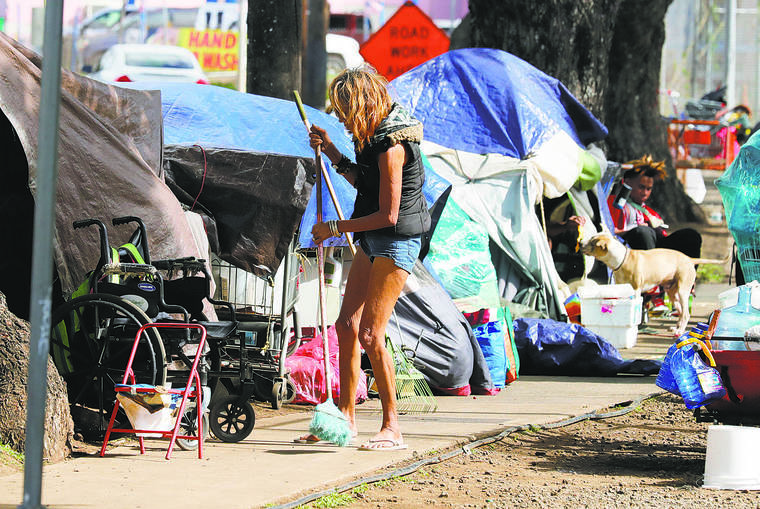Hawaii to continue paying half of airfare to help homeless return to families

JAMM AQUINO / JAQUINO@STARADVERTISER.COM
A homeless encampment on Dillingham Boulevard is seen on Jan. 7.
The state would continue to pay half the cost of airfare to send homeless people back to their families on the mainland, the Federated States of Micronesia and beyond, under a wide-ranging homeless services bill that moved out of two House committees Wednesday.
House Bill 1945 Opens in a new tab originally called for a $1.5 million appropriation from transient accommodations tax revenues — to be matched dollar-for-dollar by private donations led by Hawaii’s tourism industry. The ultimate amount of the government funding will be determined later if the bill survives.
HB 1945 passed, with amendments, out of the joint House Committee on Tourism and International Affairs and House Committee on Human Services and Homelessness on Wednesday after testimony from homeless people; nonprofit social service agencies across the state; Hawaii’s homeless coordinator; Mufi Hannemann, president and CEO of the Hawaii Lodging and Tourism Association, which helps drive private fundraising; and Connie Mitchell, whose organization, the Institute for Human Services, leads the Oahu effort to fly homeless people back to the mainland.
At the start of the hearing, Rep. Richard Onishi, chairman of the House Committee on Tourism and International Affairs, said, “We have a very large amount of people who are testifying in support. … Almost all of you support it.”
Some of the testimony came from nonprofit organizations urging passage of the bill to continue their homeless services.
But much of the testimony — and questions from House members — focused on the so-called “repatriation program” that has paid for half of the airfares to send 744 homeless people back to their families between 2014 and late last year. The families pay the other share of the airfare.
Don't miss out on what's happening!
Stay in touch with breaking news, as it happens, conveniently in your email inbox. It's FREE!
Mitchell said that some of the 646 people who have been flown from Oahu have even been sent “internationally.”
Since 2014, Hannemann previously told the Honolulu Star-Advertiser Opens in a new tab, 16 of the people flown out of Oahu later returned.
Another 68 left from Maui and 30 more were from Kauai, he said.
The program is run on three islands by the Institute for Human Services on Oahu, Maui Family Life Center and Kauai Economic Opportunity.
The homeless people are “vetted,” Hannemann told the committees.
The HLTA also wants to partner with a Hawaii island nonprofit organization to fly homeless people from the Big Island, Hannemann said.
Hannemann previously told the Star-Advertiser that the program has reunited homeless people with their families in Alaska, Colorado, Illinois, Maryland, Missouri, Montana, Oregon, New Mexico, Nevada, Texas, the Federated States of Micronesia and, mostly, California.



